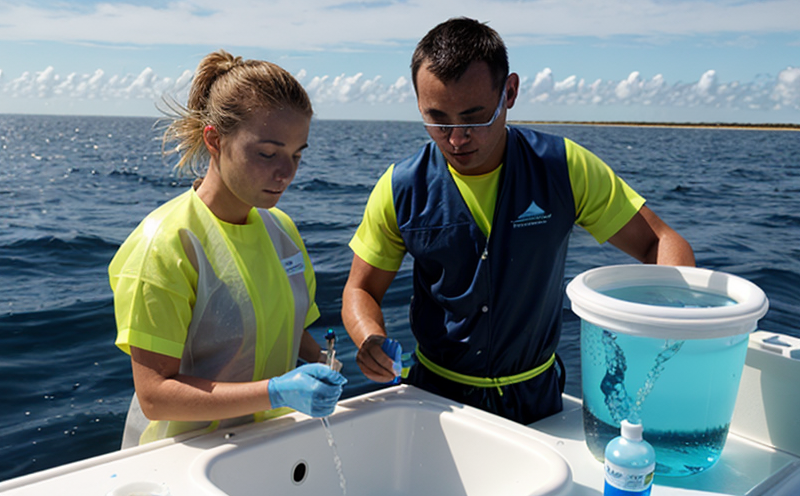ASTM D5673 Mercury Test in Seawater
The ASTM D5673 standard provides a method to determine mercury and its compounds in seawater using cold vapor atomic absorption spectrometry (CV-AAS). This test is crucial for environmental monitoring, particularly where the presence of heavy metals like mercury poses risks to marine ecosystems. Mercury contamination can have severe ecological impacts, affecting not only aquatic life but also human health through contaminated seafood.
Seawater testing under ASTM D5673 involves several key steps: sample collection, preservation, digestion, and analysis using CV-AAS. Proper sample handling is critical; seawater samples should be collected at the intended location, typically in glass containers to avoid contamination from plastic or metal containers which can introduce mercury compounds.
The digestion process aims to break down complex organic matter into simpler compounds that can be analyzed accurately. Typically, this involves acid treatment using nitric and hydrochloric acids. Once digested, the solution is filtered and diluted if necessary before being introduced into the CV-AAS instrument for analysis. The instrument measures the absorption of light by mercury vapor at a specific wavelength, providing precise concentration readings.
The ASTM D5673 standard specifies the use of high-purity reagents and calibration standards to ensure accurate results. It also outlines acceptance criteria such as precision (relative standard deviation
ASTM D5673 is widely used in marine research, regulatory compliance, and industrial applications where seawater quality must be assessed. Compliance with this test ensures that industries such as oil and gas, shipping, and aquaculture meet environmental protection standards. By adhering to ASTM D5673, laboratories can provide accurate, reproducible data on mercury levels in seawater, contributing to the preservation of marine ecosystems.
The test results are typically reported in parts per billion (ppb), which is a common unit for measuring trace elements like mercury in water. Reporting includes detailed information about sample collection, digestion conditions, and instrument settings used during analysis. This transparency enhances trust between stakeholders and supports effective decision-making processes regarding seawater quality.
Understanding the nuances of ASTM D5673 requires familiarity with both the theoretical aspects of CV-AAS and practical considerations like sample handling and digestion protocols. Regular calibration and validation of instruments are also crucial to maintain consistent accuracy over time. Proper training for personnel involved in performing these tests ensures adherence to standards and best practices.
In summary, ASTM D5673 is a vital tool for environmental monitoring focused on mercury contamination in seawater. Its application spans various sectors including marine biology research, pollution control, and industrial discharge management. By leveraging this standard method, laboratories can contribute significantly to safeguarding our oceans' health while meeting stringent regulatory requirements.
Seawater testing under ASTM D5673 demands meticulous attention to detail throughout every stage of the process—from sample collection to final analysis. Every step plays a role in ensuring reliable and accurate results that are essential for informed decision-making related to environmental protection. Understanding these complexities is key to effectively utilizing ASTM D5673 in real-world applications.
With ongoing research into the effects of mercury contamination on marine environments, there continues to be growing emphasis on accurate measurement techniques like those provided by ASTM D5673. As global concerns about pollution grow, so too does the importance placed on rigorous testing protocols such as these, making them indispensable tools in protecting our oceans' future.
Eurolab Advantages
- Accurate Results: Utilizing state-of-the-art CV-AAS instruments and strict adherence to ASTM D5673 ensures precise measurements of mercury levels in seawater samples.
- Comprehensive Support: Our team comprises experts who can guide clients through the entire testing process, from sample collection advice to interpretation of results.
- Regulatory Compliance: We ensure all tests meet international standards like ASTM D5673, guaranteeing accurate data that supports compliance with environmental regulations worldwide.
- Experience and Expertise: With extensive experience in water testing across multiple environments, Eurolab provides reliable solutions tailored to each client's unique requirements.
At Eurolab, our commitment to excellence is reflected in every aspect of our service. From cutting-edge technology to dedicated support teams, we strive to deliver the highest quality results consistently and reliably.
Customer Impact and Satisfaction
Our customers benefit significantly from using ASTM D5673 for mercury testing in seawater. By leveraging our expertise and state-of-the-art facilities, they gain access to accurate, reliable data that helps them make informed decisions regarding environmental protection.
Client satisfaction is paramount at Eurolab. We consistently receive positive feedback from satisfied customers who appreciate the quality of service we provide. Our team works diligently to ensure each project meets or exceeds expectations, fostering long-term partnerships based on trust and reliability.
The successful completion of many important projects has further solidified our reputation as leaders in environmental testing services worldwide. This recognition underscores our dedication to excellence and commitment to providing top-notch solutions that meet stringent requirements set by regulatory bodies globally.
Competitive Advantage and Market Impact
- Innovative Approach: By combining advanced analytical techniques with thorough understanding of environmental factors influencing mercury distribution, Eurolab offers unparalleled accuracy in seawater testing.
- Pioneering Research: Our commitment to innovation extends beyond just providing accurate test results; we also engage in cutting-edge research aimed at advancing knowledge about mercury contamination and mitigation strategies.
- Global Presence: With operations spanning multiple regions, Eurolab serves diverse markets with tailored solutions that address unique challenges faced by various industries operating within different geographical contexts.
These advantages position Eurolab as a leader in the field of environmental testing services. Our ability to deliver precise results consistently sets us apart from competitors and positions us at the forefront of industry trends.





